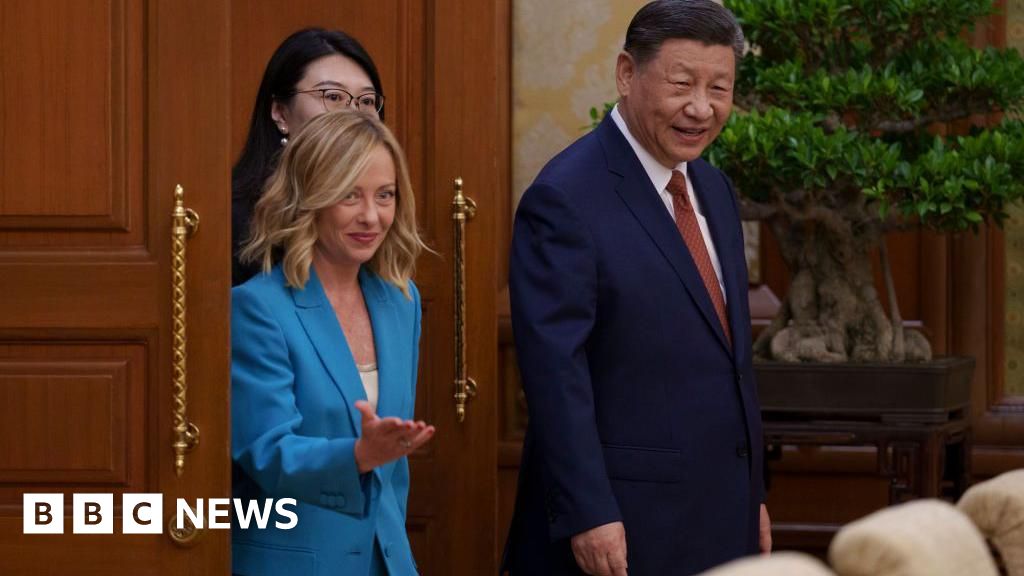Italy’s Prime Minister Meets President Xi in Beijing to Strengthen Bilateral Ties
In a significant diplomatic move, Italy’s Prime Minister Giorgia Meloni has underscored the importance of China as a key global interlocutor during her recent meeting with Chinese President Xi Jinping in Beijing. This marks her first visit to China since taking office, reflecting a concerted effort to fortify economic cooperation and manage global tensions effectively.
President Xi praised the "long-established friendly" ties between Beijing and Rome, emphasizing the pillars of "tolerance, mutual trust, and mutual respect." The summit culminated in the signing of a three-year plan aimed at bolstering economic collaboration between the two nations.
A New Chapter in Sino-Italian Relations
Prime Minister Meloni’s visit comes at a critical juncture as she seeks to "relaunch" the relationship between Italy and China. This follows a period during which China’s massive investment scheme, the Belt and Road Initiative (BRI), yielded less than anticipated benefits for Italy. In her discussions with President Xi at the Diaoyutai State Guesthouse, Meloni emphasized the necessity of China’s role in addressing global dynamics amid growing international insecurity.
"There is growing insecurity at an international level and I think that China is inevitably a very important interlocutor to address all these dynamics," Meloni stated. She highlighted the imperative for both nations to "think together" to ensure stability and peace globally.
Comprehensive Global Governance Dialogue
The Italian Prime Minister’s office revealed that the leaders’ discussions spanned several critical global issues. They addressed the ongoing war in Ukraine, the risk of further escalation in the Middle East, and rising tensions in the Indo-Pacific. Additionally, both leaders tackled essential global governance topics, including artificial intelligence, climate change, and the reform of the United Nations Security Council.
President Xi urged for the continuation of the "spirit of the Silk Road," indicating that both nations face "important opportunities for mutual development." He welcomed Italian investments in China and expressed China’s willingness to import more high-quality Italian products.
Revisiting the Belt and Road Initiative
Italy made headlines in 2019 by becoming the only major Western nation to sign up for the BRI, often referred to as the "New Silk Road." This move was met with considerable criticism from the United States and other Western countries. Meloni, who assumed office in 2022, has aimed to realign Italy’s foreign policy towards a more pro-Western and pro-NATO stance. This pivot has led to reconsidering Italy’s involvement in the BRI, which Meloni had previously criticized as "a serious mistake."
"Every country which is a [BRI] member knows that China is first and they are second, and I don’t think Italy as a G7 member wanted to be grouped together with Russia, Pakistan, or Sri Lanka," noted Alicia Garcia-Herrero, chief economist for the Asia Pacific region at investment bank Natixis. According to Garcia-Herrero, Meloni’s current engagement with China positions Italy less as a subordinate and more as an equal partner.
Trade Relations and Economic Implications
In line with her strategic diplomatic efforts, Prime Minister Meloni has also supported the European Commission’s recent decision to impose tariffs as high as 37.6% on electric vehicles imported from China. The bilateral trade between Italy and China reached an impressive €66.8 billion (£56.3bn) last year, making China Italy’s largest non-EU trading partner after the United States.
This visit signals a nuanced chapter in Sino-Italian relations, where economic interdependence and strategic diplomacy coalesce to navigate an increasingly complex global landscape.
For more information, you can visit the official website of Italy’s Prime Minister’s Office.
Image source: Getty Images
